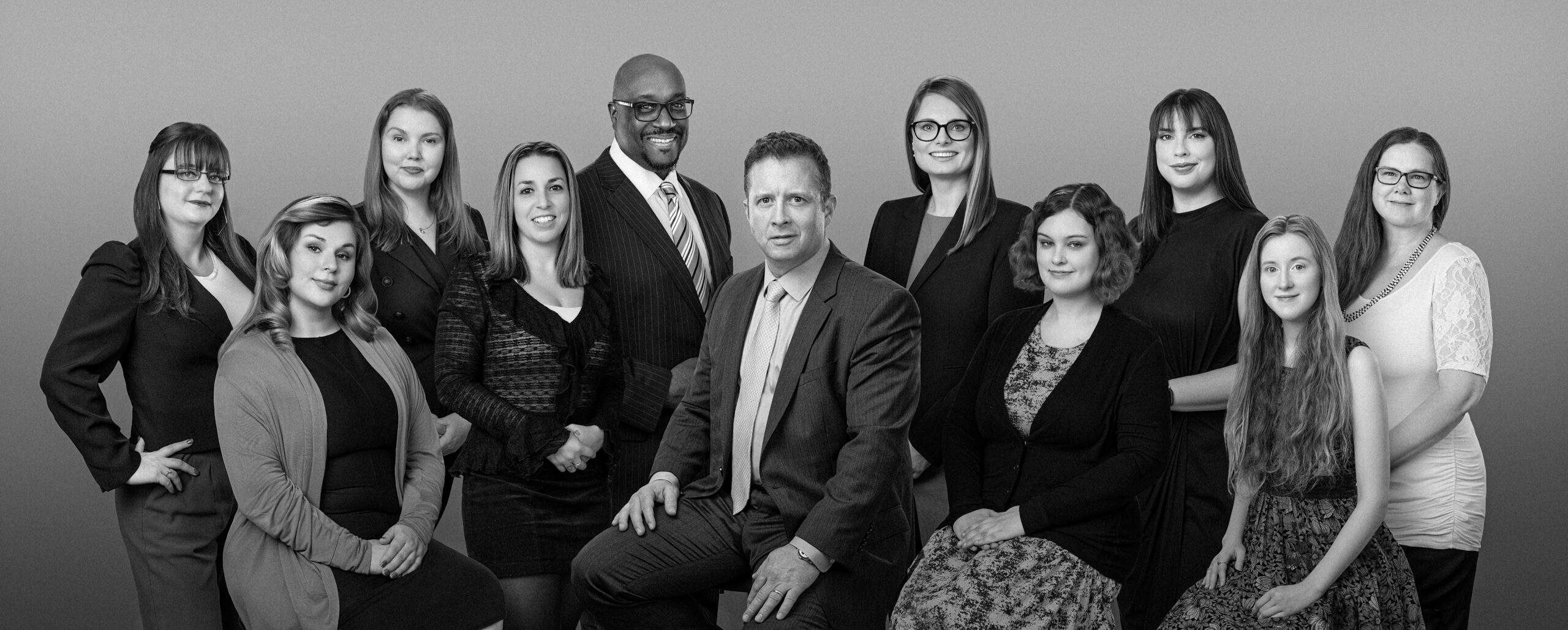How to report an accident to insurance in Washington State
According to the National Highway Traffic Safety Administration (NHTSA), there are typically around five to six million car accidents in the United States each year. With those kinds of numbers, the chances are pretty good that you'll eventually be involved in one, regardless of how careful you are behind the wheel.
In short: accidents happen. And if the result of that car accident is any kind of personal injury—especially if you weren't entirely at fault—you're going to need to report the accident to insurance and file a car insurance claim. (Actually, there's a good chance you'll need to do this for multiple insurance companies.
As if that's not frustrating enough, while you're trying to get your life back together, there's also pretty good chance the insurance company is going to play games and offer you settlement that pales in comparison to what you actually deserve.
These are all great reasons why you should strongly consider getting a car accident attorney to help you through the entire claims process, even before you file a claim.
But we're getting a little ahead of ourselves here. Let's start at the beginning.
Before the insurance claim: What to do immediately after a car accident
Some insurance companies promote the fact that you easily report an accident or even start the claims process immediately at the accident scene, through a convenient app or online form. While you could do that, technically, we tend to think it's more advisable to get a few higher priority items squared away first while you're still at the scene. This includes:
- - Calling the Washington State Patrol for an accident report. (State law requires this if there are any injuries or damages more than $1,000, but because injuries aren't always obvious at the time of the accident it's good practice to get a police report no matter what).
- - Taking photos and notes at the scene of the accident (including evidence of any injuries, vehicle damage, makes and models for the vehicles involved, skid marks and debris, and anything else that seems important).
- - Getting names and contact info for the other driver, as well as any witnesses.
- - Getting the other driver's insurance information and driver's license number.
- - Accepting any on-site medical care and visiting a doctor as soon as possible.
Once you've gotten the basics covered at the scene and have had a chance to calm down a little bit, you can report the accident to your insurance company.
Don't wait too long, though: same day or next day is ideal. Wait any longer than this, and there's a good chance your insurance company will argue that you're either lying or you didn't give them enough time to investigate the case.
Reporting your accident to the insurance company
All right, you're ready to let insurance know that you've been in an accident. Seems like it should be a simple enough affair, but these things rarely are. Let's go over some basics.
What insurance company do I call?
In all likelihood, you'll need to call more than one. There are two broad categories of insurance claims, and both my apply in your situation.
- - Third-party insurance claim: This is a claim that you file with an insurance company that represents another individual or organization. For a car accident, this almost always means the at-fault driver's insurer. In some cases, there could be other relevant third parties if there's extra blame to go around (such as the employer of the person who hit you if they were on the job, or even a bar that knowingly overserved the other driver and directly contributed to the accident.)
- - First-party insurance claim: This is a claim you make with your own insurance company. This would apply if you have no-fault insurance coverage (personal injury protection or PIP), MedPay, or uninsured and underinsured motorist coverage (UI/UIM) that you are eligible to claim.
In Washington State, the other driver's insurance company (assuming the other driver is at fault) is considered primarily responsible for covering your damages. But there's a problem: mandatory minimum coverage limits. In Washington, it's only $25,000 per person (or up to $50,000 per accident if multiple people are injured) in personal injury coverage. Even if your injuries are relatively mild to moderate, your medical bills can still eat up that amount in no time.
So, it's quite common for injured drivers to also need to report an accident to their own insurance company, too. In fact, we'd strongly recommend it.
For starters, there's a good chance they'll need to update your information anyway even if you don't need to file a first-party claim, particularly if your car is no longer drivable. But beyond that, if it turns out you do need to take advantage of any PIP or UI/UIM coverage, you will have a much easier time getting it out of your own insurance company if you contact them sooner rather than later.
What do I say?
Stick to the facts. Names, dates and times, insurance policy number, brief and factual accounts of what happened, and not a whole lot else.
You'll almost certainly be asked to give a basic description of the accident. You'll also need to notify them if you've been injured. But resist the urge to editorialize, apologize, or offer opinions. Don't offer additional information beyond what has been asked of you. Don't guess about things you don't know, and do not exaggerate or lie. Don't agree to provide a written or recorded statement. If they push you, tell them you need to talk to your lawyer, and then call us.
Why all this guardedness? Here's the dirty secret: the insurance company doesn't necessarily have your best interests at heart. This is true even of your own insurance company—not just the other driver’s.
Friendly though they may seem, the insurance agent who talks with you and investigates your claim is being paid to look for holes and inconsistencies in your story, and ways to help the insurance provider limit your payout. Even if you believe you've been completely honest, that's unfortunately no guarantee the insurance agent won't twist an accidental misstatement or misunderstanding and use it against your case.
What happens next?
An insurance adjuster will investigate your personal injury claim. Meanwhile, you should focus on doing what you need to do to heal and get your life back together.
Again, don't trust the insurance company to have your best interests at heart. Most will offer you only a lowball settlement offer (at best) out of the gate, far less than what your case is truly worth. But if you've decided to simply trust their adjuster and aren't gathering your own evidence, how will you refute them?
Common problems faced by inexperienced claimants include:
- - Proving fault. The other driver's insurance company may try to argue that you were at least partially responsible for the crash, which would reduce the amount of compensation you could receive.
- - Proving the validity of injuries. It's not unusual for insurers to argue that an injury was pre-existing, unrelated to the accident, or not as serious as you claim it to be. You'll need comprehensive medical records to fight back against this nonsense.
- - Underestimating damages. Carefully keep track of medical expenses, lost wages, and other costs related to the accident.
If this all sounds overwhelming, well, that's partly by design. If you don't know what to keep track of, what your rights are, or how to calculate the true value of your case, it's that much easier for the insurance company to get away with paying you pennies on the dollar for your personal injury.
Don’t wait to call a personal injury lawyer like Zach Herschensohn after a car crash
Insurance companies try to make it sound like filing a claim is the easiest, most convenient thing in the world. They're hoping you'll decide to handle your case yourself and not even talk to an attorney beforehand. And in a lot of cases, that can be a serious mistake.
An experienced car accident attorney like Zach Herschensohn can take the pressure off you and your loved ones pretty much right away. Some concrete things they can help with include:
- - Ensuring you get all the medical care you need to recover as quickly and completely as possible.
- - Speaking with the insurance adjuster on your behalf, which prevents you from accidentally saying anything that could hurt your case.
- - Fully investigating your case and gathering all the evidence you need to defend your rights convincingly, including bringing on expert witnesses (medical pros, accident reconstructionist, and more) that most ordinary car crash victims wouldn't typically have access to.
- - Accurately estimating the full, fair value of your case, which considers not only medical expenses and lost wages but also emotional anguish, pain and suffering, and other meaningful damages which are less straightforward to calculate.
- - Vigorously defending your rights in settlement negotiations and, if necessary, in court.
Really, what it comes down to is peace of mind. Recovering from a car accident is hard, especially if you've been badly hurt. Fighting against the insurance company at the same time makes it immeasurably worse, particularly if you don't really know what you're doing.
By handing off your case to a car accident attorney like Zach Herschensohn, you not only relieve yourself of all that stress and burden, but statistically speaking you also have a better chance of winning your case, and getting a higher settlement if you do win. Hard to beat that combo, in our humble opinion.
Herschensohn Law is here for the injured in Kent, Seattle, and throughout Washington
The team at Herschensohn Law doesn't shy away from the toughest cases. We have a well-earned reputation for standing up for the injured and demanding a fair outcome, and we'd love the opportunity to speak with you about your case. Our consultations are always free, and you won't pay anything until and unless we win you a settlement or award at trial.
To request your free case evaluation, fill out our simple online contact form or call our office in Kent, Washington at (206) 588-4344.
References
Stewart, T. (2022, March). Overview of motor vehicle crashes in 2020 (Report No. DOT HS 813 266). National Highway Traffic Safety Administration.
The content provided here is for informational purposes only and should not be construed as legal advice on any subject.






